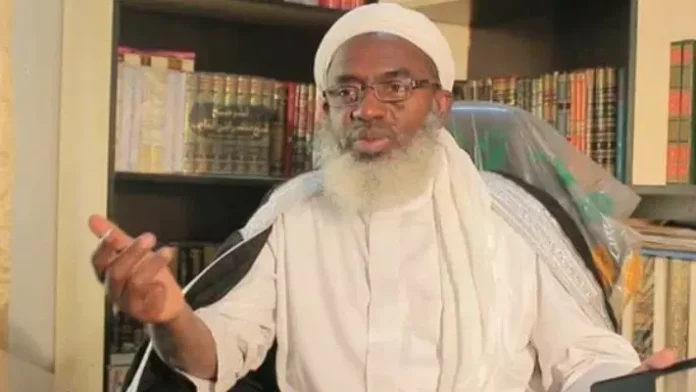Renowned Islamic cleric, Sheikh Ahmad Gumi, has strongly defended himself against growing calls for his arrest over his continued engagement and public commentary on banditry and national security issues. In a statement posted on Facebook on Sunday, the Kaduna-based scholar described those demanding his arrest as “spineless, irresponsible and unpatriotic imbecilic people” who prefer anger and sentiment to truth.
Gumi, who has become one of the most controversial religious figures in national conversations around insecurity, insisted that he had committed no crime by reaching out to armed bandits in parts of northern Nigeria. According to him, his actions were guided by the aim of promoting peace, reducing bloodshed, and encouraging dialogue in states battling widespread violence.
For several years, Sheikh Gumi has positioned himself as an intermediary between government authorities and bandit groups operating across the North-West. His visits to forests, where he held meetings with armed groups, attracted both praise and criticism. Supporters called him a “bridge-builder” who was willing to go where many feared to go, while critics accused him of being too close to criminals and possibly legitimising their activities.
These concerns intensified as banditry worsened, particularly between 2019 and 2023, when hundreds of communities in states such as Kaduna, Zamfara, Katsina, Niger and Sokoto experienced repeated attacks, mass kidnappings, and loss of lives. Many Nigerians argued that negotiating with bandits was a dangerous path that encouraged impunity, while others believed dialogue was necessary due to the military’s struggle to contain the violence.
In recent weeks, calls have grown louder for security agencies to arrest Gumi, especially after he made several comments questioning government strategies and calling for direct engagement with the armed groups. But on Sunday, he pushed back sharply.
In his Facebook post, Gumi accused his critics of being driven mainly by bigotry, ignorance, and intolerance for opinions that differ from their own.
“ARREST HIM!!! These are the only words some spineless, irresponsible and unpatriotic imbecilic people can utter,” he wrote. He argued that such individuals were not interested in real solutions to Nigeria’s insecurity problems but were instead motivated by hatred and blind politics.
According to the cleric, his engagement with bandit leaders was not a private adventure done behind the government’s back. He insisted that all his missions were transparent, legitimate, and carried out with the full knowledge and approval of relevant security authorities.
To support his argument, Gumi recalled one of his most publicised interventions, which took place in January 2021 in Sabon Garin Yadi forest, located in Giwa Local Government Area of Kaduna State.
During that visit, the cleric said he was escorted by the Kaduna State Commissioner of Police, who at the time represented the Inspector-General of Police (IGP). This, he said, showed clearly that the authorities were not only aware of his activities but were actively involved in facilitating them.
According to Gumi, more than 600 armed bandits and their commanders attended the meeting.
“This meeting was part of a peace initiative where we preached to over 600 bandits and their commanders, who agreed to lay down their arms in exchange for security and basic amenities,” he said.
He explained that the goal of the dialogue was to encourage the criminals to surrender their weapons, abandon violent activities, and accept rehabilitation. The cleric added that many of the fighters complained of neglect, lack of education, and absence of government presence in their communities—conditions he believes helped fuel the rise of banditry.
Sheikh Gumi has long argued that the roots of banditry lie in poverty, illiteracy, ethnic tension, and the collapse of local grazing economies. He believes the crisis is not simply a law-enforcement issue but also a social and economic problem that requires dialogue and reform.
His proposals have included:
granting amnesty to repentant bandits,
creating grazing reserves and modern ranching systems,
deploying more education and healthcare services to remote rural areas,
and treating bandits in the same way Niger Delta militants were treated in the 2000s.
However, many Nigerians strongly reject these ideas. They argue that bandits are not political agitators but criminal gangs responsible for murder, mass kidnappings, rape, and destruction of entire villages. For this reason, critics insist that granting them recognition or concessions only sends the message that violence pays.
The federal government, especially under former President Muhammadu Buhari, took a mixed approach that involved both military operations and informal outreach by various actors. Under the current administration of President Bola Ahmed Tinubu, the government has emphasised stronger military action while discouraging non-state actors from engaging with criminal groups.
Gumi accused those calling for his arrest of ignoring the full history of his work and the involvement of security agencies in facilitating his missions. He said many Nigerians prefer anger over thoughtful reflection, especially on sensitive issues like banditry.
He argued that the demands for his arrest are being made for political reasons, not because he broke any laws.
According to him, “bigotry, ignorance, and intolerance for differing viewpoints” are the main forces driving these calls.
The cleric claimed that instead of learning from past efforts and exploring solutions that could reduce bloodshed, many political actors have chosen to use insecurity as a tool for gaining support or attacking opponents.
Sheikh Gumi’s comments are likely to further deepen Nigeria’s long-running debate on how to tackle banditry. While some Nigerians believe dialogue is necessary when violence becomes unmanageable, others insist that only strong military action can restore order.
Gumi, meanwhile, remains a polarising figure. For his supporters, he is a brave cleric who risked his life to reach out to dangerous armed groups in the hope of restoring peace. For his critics, he is giving criminals undue recognition and possibly obstructing the government’s anti-crime efforts.

